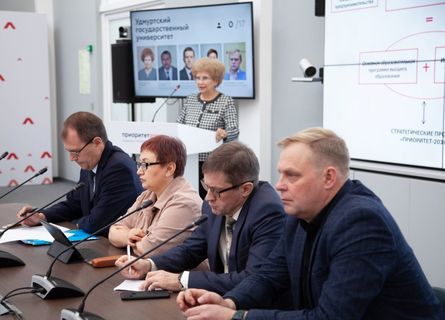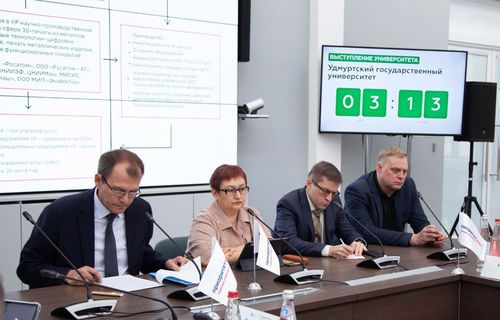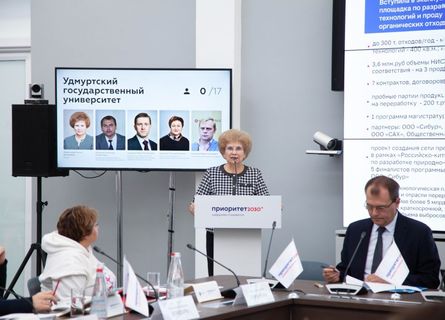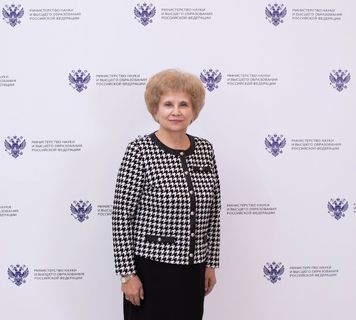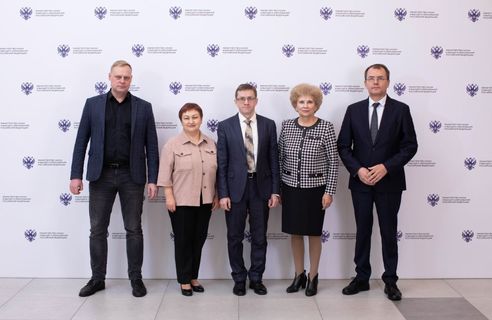On November 25, 2023 the UdSU representatives reported to the Ministry of Science and Higher Education of Russia Commission on the outcomes of the university development program under Priority 2030.
The team included the UdSU Rector Galina V. Merzlyakova, the Vice-rector for research and strategic development programs Aleksandr M. Makarov, the Vice-rector for informatization, e-learning environment and career guidance Pavel M. Khodyrev. The UdSU delegation was supported by the Deputy Chairman of the Government of the Udmurt Republic Tatiana Yu. Churakova and the Deputy Director of the Unmanned Systems Group Vadim S. Kuznetsov.
UdSU Rector presented the interim results of the university’s strategic projects and underlined the following achievements:
“UdSU and ROSATOM have opened Russia’s first public Center for Additive Technologies to provide scientific and technical support to the complex geometry items production of mechanic industry. Udmurtia’s first research and manufacturing base for the processing of organic waste is created as a technological platform for the industry development in the Republic. A system providing the tourism industry with digital products is built: over 20 digital products have been developed for Udmurt tourism enterprises. Our students have mastered the “Digital Profession” through studying the digital unit within the Basic Educational Program framework. 150 digital projects and over 100 theses have been defended. Overall, it is important to mention that the Priority 2030 program forms the modern image of the university and contributes to the attraction of young people to the region”.
Other project outcomes are as follows:
Within the project framework “Creation of a Smart Competence Center for Digital Transformation of the Region”:
- A device for measuring the thickness of a hot tin oxide coating on glass products is designed. The device helps to reduce fault rate in the glass industry. Currently, the Plant of Microelectronic Technologies, the industrial partner of the university, is putting the production of devices on the flow.
- A device for measuring ozone concentration in the air is designed. It can be used in surgery, water disinfection and wastewater treatment. Precise control of ozone concentration allows the ozonizer to treat wounds in field conditions. A sample is produced and the operating characteristics are confirmed. Industrial partner – Plant of Microelectronic Technologies LLC (Izhevsk).
- A joint public Center for Additive Technologies between ROSATOM and UdSU is established. CAT is the first scientific industrial organization in the field of 3D metal printing in Udmurtia. It includes 15 units of specialized hardware. CAT’s key technologies are digital simulation, metal products printing, functional plating. Five large enterprises of Udmurtia have already pre-ordered from CAT.
- A cyberphysical educational system in the field of cyber security and the domestic software integration boost is established. The system provides support for the transition of enterprises and government bodies of Udmurtia to domestic software, increasing the cyber security in the region.
- The system is created in the partnership with RED OS LLC, InfoWatch JSC (Kaspersky Lab), the Ministry of Digital Development of Udmurt Republic and other organizations.
Within the project framework “New quality of life: a response to modern bioeconomic challenges”:
- A unique digital information platform for managing the green fund of settlements “Geographic information system for managing green areas in the city “Code Green”” is established. It provides individual tree accounting and support for management decisions. Currently, more than 16.5 thousand trees in Izhevsk have been digitized. The system reduces the administrative processing of the green fund management by 2-3 times and the landscaping work expenses.
- The production of “Biohumus” and “Dry Animal Foods” is launched. Its uniqueness lies in the vermicompost formula adapted to the regional conditions (phosphorus, nitrogen, potassium content) and the high protein content in dry foods (up to 45%). These products are targeted at agricultural enterprises. The dry foods use in the calf feeding rations is reasoned and the biohumus use for the vegetables and ornamental crops cultivation has proven to be effective.
- A web system for online diagnosis of Parkinson's disease based on processing electroencephalography data by a neural network is created and tested. The neural network is able to predict Parkinson's disease with over 92% precision.
Within the project framework “Udmurtia in the global cultural space”:
- The laboratory “Virtual Technologies in Tourism” is opened. 11 digital products (virtual tours, audio guides, interactive maps and models of historical monuments) were created on this platform in 2023. The laboratory also fulfilled 6 Additional Educational programs.
- A model of ethnocultural branding of municipalities is developed and implemented. It is based on the scientific approach to the national code use. The model uses the cultural phenomena of Udmurtia to boost the region competitiveness. Ethnocultural branding of three objects in two municipalities of the Udmurt Republic took place in 2023. There is an attendance increase – up to 2 times. 9 projects were fulfilled, 7 agreements for the transfer of intellectual property are made in the course of branding.

